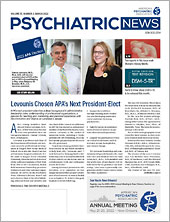In the last two years, Americans, individually and collectively, have faced many challenges including a global pandemic, a mental health crisis, an insurrection, and a social justice uprising. These events have led Americans to reflect upon who we are as individuals, members of a community, a nation, and global citizens.
Psychiatrists regularly meet with patients wrestling with their identity, but what happens when the “patient” is a nation? On January 15, the 93rd birthday of the late Rev. Dr. Martin Luther King Jr., members of APA’s Area 4 gathered to reflect upon Dr. King’s legacy, the modern-day civil rights movement, and our identity as physicians and patient advocates. The program, “Honoring Rev. Dr. King: How Social Justice Impacts Mental Health,” was hosted by Area 4’s Health Equity and Social Justice committees, and I served as moderator. Our special guest discussant was Minnesota Attorney General (AG) Keith Ellison. He challenged us to examine both ourselves and our medical specialty and to address the nation’s collective trauma due to the COVID-19 pandemic.
Area 4 includes the state of Minnesota. On May 25, 2020, a day when we traditionally honor those fallen in the name of maintaining our democracy, George Floyd, an unarmed Black man in Minneapolis, became an unsuspecting martyr for a modern civil rights movement, and the city became ground zero of a social justice uprising.
Mr. Floyd was a 46-year-old man arrested after a clerk suspected he had passed a counterfeit $20 bill. Four officers were called to the scene, including one veteran officer, who knelt on Mr. Floyd’s neck and back for 9 minutes and 29 seconds. Before he lost his life, Mr. Floyd pleaded with a crowd gathered nearby to aid him. His words “I can’t breathe” ignited a movement, and the circumstances of this equivalent of a public lynching highlighted issues that have plagued Black Americans for 400 years. Among them are overpolicing of Black communities, police brutality, sanctioned lynchings, and the impact of psychiatrists’ bias toward Black people that led to their institutionalization, segregation in hospitals, misdiagnoses, inappropriate or no care, and more. The social justice movement rapidly inspired oppressed people around the world and raised the profile of many Minnesota-based civil rights advocates like AG Ellison.
AG Ellison is a national leader who is the son of a social worker and psychiatrist, and his family members were actively engaged in the civil rights movement. This pedigree, along with his candor, humor, and depth of understanding of American history, prepared him to put action to the powerful words of Dr. King: “Injustice anywhere is a threat to justice everywhere.” However, the perception of who is experiencing the injustice and the definition of injustice in America has divided our nation.
Due to the extreme divisiveness in our country, pillars of our democracy, such as the U.S. Capitol and the sanctity of voting, are under attack. Will psychiatrists become an integral part of the healing process or will psychiatrists once again be on the wrong side of history? Psychiatric physicians are the experts in treating people with mental health disorders; we are brain specialists. We are now challenged to be on the right side of history by playing our part to unite a nation divided by fear of a virus and the vaccination to prevent infection and fear of “others,” defined by AG Ellison as “people outside the circle of our compassion.” Dr. King said, “People fail to get along because they fear each other; they fear each other because they don’t know each other; they don’t know each other because they have not communicated with each other.” Our fear has become a radicalized anxiety leading to nationwide division, declared AG Ellison.
At one point, AG Ellison was asked how White allies can join minority communities to address this fear and end systemic racism. He responded by reminding us that the civil rights movement improved the lives of not only Black Americans but all Americans. Therefore, the civil rights movement and the more recent social justice uprisings belong to all of us—this is an American movement, not a Black movement.
The civil rights movement and Dr. King’s legacy have been sanitized over time. We now associate Dr. King with nonviolent actions, such as leading peaceful marches through angry crowds, sitting at a lunch counter, or writing historical speeches while sitting alone in a jail cell. While Dr. King regularly spoke about nonviolence, the civil rights movement was extremely violent as those strongly opposed to change—and frankly opposed to even viewing Black people as human—engaged in extreme violence to halt the movement. There was very little that was not violent about the civil rights movement, including Dr. King’s assassination. Yet, many Americans were surprised that more than 400 years of accumulated anger and frustration over oppression, systemic racism, and vicarious trauma led to scattered acts of violence, looting, and property destruction. However, these protests also sparked both individual and national reflection, accountability, change, and trauma.
AG Ellison gave historical examples of police officers who captured runaway slaves and limited the freedoms of Black people in the North and South. He described years of police misconduct and the use of excessive force to brutalize Black bodies. He also shared how the police have been overtaxed and stressed by the expansion of their duties from addressing life-threatening events (only 1% to 3% of emergency calls are related to violent offenses), interpersonal conflicts, nuisance crimes, and mental health emergencies. The expansion of their duties and the inappropriate and sometimes criminal behaviors of a minority of police officers have resulted in the emotional crises they experience each day. AG Ellison compared the bad actors among the police force to a poison destroying all it touches. One effective solution is to hold those officers accountable to decrease the stress on all. Police officers have had an increased incidence of posttraumatic stress disorder (PTSD) and suicide, and correctional officers have the highest rates of PTSD and suicide of any profession in the United States, according to Lisa Jaegers, Ph.D., and colleagues in the June 2018 Journal of Occupational and Environmental Medicine.
So how can psychiatrists address this collective trauma? AG Ellison stated, “Our nation needs a healing.” We were challenged to inspire hope and focus on our collective goal to achieve an equal, just, and fair society. He challenged Black psychiatrists to address mental health stigma in those communities and to target direct and vicarious trauma experienced in Black communities. He called upon psychiatrists to take a lead role in bridging the division between minority communities and law enforcement officers as well as to become involved in addressing their stressors and training to better recognize rapidly evolving threats versus a person in crisis.
In addition, AG Ellison emphasized our role in addressing misinformation and disinformation about the COVID-19 pandemic and related mitigation efforts. And finally, he stayed true to his family roots by emphasizing the critical need to address both physical and mental health disorders. To that end, AG Ellison announced that his office is seeking information to pursue entities that are not enforcing the Mental Health Parity and Addiction Equity Act.
In short, America is at a crossroads in our history as collectively we learn to fight a deadly virus and not each other and the structural racism made apparent by the pandemic. AG Ellison emphasized that “everyone gets to participate” in the struggle to end systemic racism, and psychiatrists must “show up and be present” to address America’s ongoing trauma by finding a message, albeit not perfect, that “resonates with the majority [in the quest] to seek justice for all.” We also need to do our part in ensuring that we call out racism whenever we see it—in both our private and professional lives—and check ourselves for conscious and unconscious biases. ■
“Posttraumatic Stress Disorder and Job Burnout Among Jail Officers” is posted
here.

